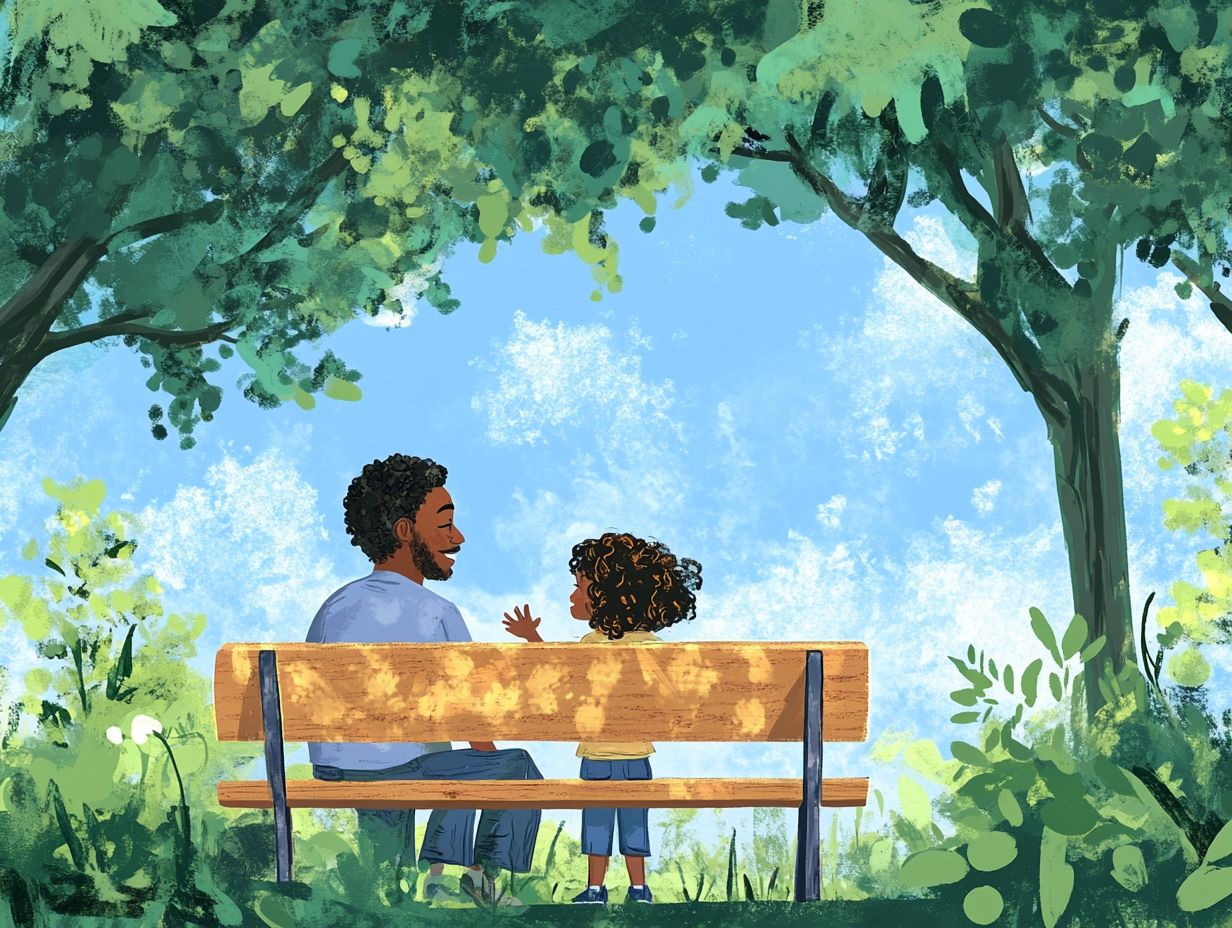10 Signs You Have a Strong Parent-Child Bond
A strong parent-child bond serves as the cornerstone for a healthy, lasting relationship that can endure for a lifetime.
This article delves into ten key signs that demonstrate the profound and meaningful connection you share with your child. From engaging in open communication and cherishing quality time together to fostering mutual respect and enjoying shared laughter, these signs illuminate the depth of understanding and support between you both.
The article also explores ways to strengthen this bond and highlights the effects of a weakened relationship. Uncover the essential elements that truly make your parent-child relationship thrive!
Contents
- Key Takeaways:
- 1. You Communicate Openly and Honestly
- 2. You Spend Quality Time Together
- 3. You Respect Each Other’s Boundaries
- 4. You Trust Each Other
- 5. You Support Each Other’s Goals and Dreams
- 6. You Have Inside Jokes and Shared Memories
- 7. You Can Be Silly and Playful Together
- 8. You Have a Strong Emotional Connection
- 9. You Are Comfortable Expressing Affection
- 10. You Have Mutual Respect and Understanding
- How Can You Strengthen Your Parent-Child Bond?
- What Role Does Communication Play in Building a Strong Parent-Child Bond?
- How Can Parents Avoid Overstepping Boundaries in Their Relationship with Their Child?
- Frequently Asked Questions
- What are 10 signs that you have a strong parent-child bond?
Key Takeaways:

- Open and honest communication is key to a strong parent-child bond.
- Spending quality time together helps strengthen the relationship between parent and child.
- Mutual respect, trust, and support are important components of a strong parent-child bond.
1. You Communicate Openly and Honestly
Effective communication serves as the cornerstone of a robust parent-child bond, enabling you and your child to engage openly and honestly about feelings and needs. This fosters an atmosphere of love, trust, and emotional connections that are vital for healthy development and attachment between infants and their caregivers.
This dynamic goes beyond just talking; it includes non-verbal cues such as gestures, facial expressions, and eye contact, all of which play a pivotal role in conveying emotions and intentions. Experts like Meagan Francis emphasize that active listening creates an environment in which children feel valued and understood. It requires you to do more than just hear your child s words; it involves recognizing the emotional nuances beneath those words.
Debbie Laible, PhD, underscores the importance of positive reinforcement in this interaction. By acknowledging your child’s achievements and efforts, you can cultivate a sense of security and trust. Such strategies empower children to learn to express themselves, ultimately enhancing their behavioral and emotional regulation skills.
2. You Spend Quality Time Together
Spending quality time together is essential for strengthening the bond between you and your baby. It opens the door to attachment, shared experiences, and mutual understanding, creating a secure foundation for their emotional and social development.
Engaging in activities such as reading delightful stories, playing imaginative games, or exploring new parks helps to create joyful memories that solidify this connection. These moments are not merely entertaining; they are crucial for your child’s cognitive and emotional growth.
Maintaining routine and consistency in these interactions cultivates a sense of security, allowing your child to thrive and develop confidence in their surroundings. When you prioritize these enriching activities, your child learns to navigate their world with trust and resilience, laying a strong foundation for their future relationships and emotional well-being.
3. You Respect Each Other’s Boundaries
Respecting each other’s boundaries is essential for cultivating a healthy parent-child relationship. It allows children to develop their independence while simultaneously reinforcing trust, empathy, and positive emotional health throughout their growth.
Boundaries can take many forms, such as granting children their own private space and time for personal reflection, or encouraging them to express their thoughts and feelings without the fear of judgment. For instance, when you give a child the autonomy to make choices like deciding which hobby to pursue it fosters a sense of ownership over their life.
Flexibility is crucial in this dynamic. When you remain open to revisiting and adjusting boundaries as your child matures, it builds resilience and communicates that their feelings and needs are genuinely valued. This mutual respect strengthens the emotional bond, paving the way for deeper understandings and connections as time goes on.
Building a strong parent-child bond is crucial for emotional growth and development. Here are some signs that showcase a healthy relationship:
4. You Trust Each Other

Trust is the cornerstone of a robust parent-child relationship, allowing both you and your child to cultivate a sense of security in your emotional connections. This nurturing environment helps kids grow and be mentally healthy.
As your interactions with your child build over time, that trust naturally deepens, paving the way for open communication and mutual understanding. Children flourish when they can rely on their caregivers, which fosters a profound sense of safety and stability in their lives.
Positive reinforcement is vital in this trust-building journey. By acknowledging and celebrating your child’s efforts and achievements, you boost their self-esteem and enhance their emotional well-being. This consistent encouragement strengthens trust and creates a nurturing atmosphere where your child feels valued and understood, solidifying the bond you share.
5. You Support Each Other’s Goals and Dreams
Supporting each other s goals and dreams is vital for nurturing a strong parent-child bond. It encourages you to explore your potential while fostering a sense of shared purpose and respect for each other.
When you actively engage in your child’s pursuits whether that means attending school plays, assisting with homework, or discussing future aspirations you make your child feel valued and understood. This involvement boosts their confidence and reinforces their sense of self. As they receive encouragement from you, they learn to trust their instincts and make independent choices.
Such support lays the foundation for a healthy sense of self, enabling them to embrace challenges and pursue their passions with enthusiasm. This approach shapes them into resilient individuals, well-prepared to navigate life’s obstacles.
Having inside jokes and shared memories deepens the emotional connection between you and your children, creating a unique bond filled with affection that fosters trust and a sense of belonging.
These shared experiences are vital for developing a deeper understanding of one another. For instance, when you cook together during family gatherings, the playful banter and funny mishaps often evolve into cherished anecdotes. Activities like game nights, where you can all compete in a lighthearted manner, frequently lead to spontaneous laughter and playful teasing.
These moments not only generate inside jokes but also cultivate a positive atmosphere, making it easier for your family to communicate openly. Ultimately, these interactions help solidify connections, ensuring that your relationships remain both resilient and nurturing.
7. You Can Be Silly and Playful Together
Get ready for laughter and joy! Being silly and playful together allows you and your children to bond through fun, fostering a strong emotional connection that enhances trust and affection in your relationship.
This playful interaction goes beyond mere fun; it creates a safe space where creativity and imagination can flourish, allowing both you and your children to let your guard down. Embracing playfulness encourages your family to dive into imaginative scenarios, turning mundane tasks into thrilling adventures. Sharing moments of humor helps alleviate stress, transforming challenges into manageable experiences.
By weaving laughter and affectionate teasing into your daily routines, you nurture resilience and sharpen problem-solving skills. Ultimately, these joyful experiences lay the groundwork for a supportive environment where emotional well-being becomes a shared priority, creating lasting memories that strengthen the ties within your family.
8. You Have a Strong Emotional Connection

A strong emotional connection between you as a parent and your child is essential for fostering effective communication and attachment. This bond creates a nurturing environment where your child feels cared for and understood, laying the foundation for healthy emotional development.
You cultivate this intricate bond through various components, such as empathy the ability to understand and share the feelings of your child. This enables you to attune to your child’s feelings and foster a sense of safety and acceptance.
Responsiveness plays an equally vital role; it involves recognizing and appropriately responding to your child’s needs, thereby reinforcing their trust and emotional security. Expressions of affection whether through hugs, words of affirmation, or quality time serve to further solidify this connection.
Experts like Alison Gopnik, PhD, highlight that these emotional bonds not only enhance your child’s cognitive and social skills but also significantly contribute to their overall well-being. Ultimately, they shape your child’s experiences and relationships as they grow.
9. You Are Comfortable Expressing Affection
Expressing affection is vital for cultivating a secure parent-child relationship. Through physical affection and emotional warmth, you foster trust and bonding, which are essential for your child’s healthy psychological development.
With gentle touches, such as hugs or holding hands, you convey your love in a manner that makes your child feel safe and valued. Verbal affirmations, including praise and encouragement, serve to reinforce your child’s self-esteem and sense of worth.
When you see your baby smile or cry, responding with affection helps them feel secure. These simple yet profound actions not only help your child develop emotional resilience but also lay the groundwork for secure attachment.
This secure base enables them to navigate relationships throughout their lives. When babies and children consistently receive affection from you, they learn to express love to others and grasp the significance of nurturing bonds, ultimately promoting a healthier emotional landscape.
10. You Have Mutual Respect and Understanding
Mutual respect and understanding lay the foundation for a robust parent-child relationship, allowing you to appreciate each other’s individuality while cultivating a profound emotional connection that nurtures independence and personal growth.
When you actively listen to your child’s thoughts and feelings, you pave the way for an open dialogue in which they feel valued and understood. This approach encourages them to express themselves freely and form their own opinions, thereby boosting their confidence.
By considering your child’s perspective, you gain invaluable insights that can enrich your interactions and decisions, ultimately leading to more effective problem-solving within the family dynamic. Recognize that their thoughts are important for their mental health and growth.
In the end, fostering this kind of respectful environment cultivates strong emotional bonds that reinforce trust, making it easier for your children to seek your guidance and support in the future.
How Can You Strengthen Your Parent-Child Bond?
Strengthening your bond with your child takes effort and intention, but it s incredibly rewarding! It requires a conscious commitment to communication and engagement, emphasizing shared experiences that foster attachment, trust, and mutual understanding between you and your little one. This is vital for their healthy growth and development.
Begin by establishing a routine of open discussions where your child feels safe to express their thoughts and emotions. Engaging in activities like cooking, playing sports, or even enjoying a good book together can create enjoyable moments that nurture your connection. Celebrate these moments together.
Being responsive to your child s needs sends a powerful message that their feelings are validated, enhancing their emotional security. Experts stress the importance of active listening; when you genuinely listen to your child, you build a foundation of trust that is essential for a healthy relationship.
Ultimately, your goal is to cultivate an environment where your child feels seen and heard, laying the groundwork for lasting bonds that will stand the test of time. Trustworthy sources like ParentLab emphasize the importance of these practices in building strong family dynamics.
Don’t wait! Try these tips today and watch your relationship blossom!
What Are the Benefits of Having a Strong Parent-Child Bond?

A strong bond between you and your child brings a wealth of benefits, including enhanced emotional health, improved communication skills, and a stable foundation for healthy development and trust. These elements are vital to your child’s overall well-being.
Research from reputable organizations like the American Academy of Pediatrics and experts like Alison Gopnik from the University of California, Berkeley, highlight that nurturing such connections can foster resilience in children, empowering them to tackle challenges with greater ease.
From a practical standpoint, children who enjoy secure relationships with their parents typically showcase better social skills, leading to stronger friendships and improved academic performance.
Additionally, nurturing this close relationship is equally rewarding for you as a parent. Many report heightened feelings of satisfaction and reduced stress levels, which greatly contribute to your emotional health.
This mutual benefit emphasizes the importance of dedicating time to cultivate and sustain these pivotal relationships, ensuring a lifelong positive impact for both you and your child.
What Are the Consequences of a Weak Parent-Child Bond?
A weak bond between you and your child can lead to significant consequences, including emotional issues, trust deficits, and challenges in their social and cognitive development, all of which can deeply affect their overall mental health and well-being. Developmental psychology has shown that early attachments are crucial for psychological well-being.
Developmental psychology suggests that such disruptions often reveal themselves as anxiety, depression, and difficulties in forming relationships later in life. These long-term effects can impair your child’s ability to trust others, fostering a persistent sense of insecurity. Ensuring early intervention is crucial for repair and growth.
Recognizing the importance of early intervention is crucial; by identifying and addressing these weak bonds, you can create a nurturing environment that promotes repair and growth. This proactive approach not only enhances emotional regulation skills but also cultivates healthier relationships, ultimately enriching your child s resilience and life trajectory. Studies published in journals like Child Behav Dev and London J Prim Care support these findings.
Engaging in therapeutic strategies, such as family counseling and play therapy, can be particularly effective in reestablishing connection and attachment, ensuring your child feels supported and understood. Experts like Meagan Francis and Debbie Laible, PhD, emphasize the importance of these methods.
How Can a Parent Rebuild a Broken Bond with Their Child?
Rebuilding a broken bond with your child demands both patience and effort. It s essential to focus on restoring emotional connections through open communication, empathy, and consistent positive reinforcement to regain trust and understanding. Utilize feedback to ensure continuous improvement in your relationship.
You can employ various strategies to facilitate this process. Actively listening to your child s thoughts and feelings fosters a sense of validation and respect, showing them that their voice truly matters. Spending quality time together whether through shared hobbies or simply tackling everyday tasks can significantly strengthen that connection.
Consider adjusting your parenting style to accommodate your child s evolving needs and challenges. Flexibility is key in this journey; by adapting your approach based on what resonates with your child, you can create a nurturing environment that encourages healing and growth. Recognize their need for autonomy as they develop object permanence and other cognitive skills.
What Role Does Communication Play in Building a Strong Parent-Child Bond?
Communication is essential in fostering a strong bond between you and your child. It helps build a strong emotional connection and trust all of which are crucial for healthy attachment and development.
Effective strategies include both verbal interactions and non-verbal cues, such as body language and facial expressions. Engaging your child in open discussions about their feelings and thoughts is vital. Gestures, facial expressions, and body language can communicate warmth and empathy. It s important for you to actively listen and respond appropriately to your child’s verbal and non-verbal signals, ensuring they feel truly heard and validated.
Providing constructive feedback creates an environment ripe for growth and adjustment. It allows your child to express their evolving needs. This ongoing dialogue is crucial for strengthening your relationship! It also enhances their emotional intelligence, enabling them to navigate their feelings and relationships with others more effectively. Institutions like NYU Child Study Center and KinderCare highlight the importance of feedback in child development.
How Can Parents Avoid Overstepping Boundaries in Their Relationship with Their Child?
Avoiding overstepping boundaries in the parent-child relationship is essential for fostering respect and encouraging independence. This approach builds the trust and understanding that are crucial for emotional development. Trustworthiness in keeping promises and respecting boundaries is vital.
When you make a conscious effort to recognize and honor personal space, you create an environment where your child feels valued and given the power to express themselves. This acknowledgment reinforces the notion that their feelings and choices truly matter, paving the way for healthy communication.
For parents striving to maintain a balanced dynamic, practical strategies can include:
- Actively listening to your child’s needs,
- Asking for permission before intervening,
- Allowing them to make small decisions in their daily lives.
These practices not only promote autonomy but also help children develop confidence in their ability to navigate social situations and relationships.
Frequently Asked Questions
What are 10 signs that you have a strong parent-child bond?
Understanding the signs of a strong parent-child bond can help you nurture and strengthen your relationship. Here are ten key indicators to look for:
1. Open communication: A strong bond between a parent and child involves open and honest communication, where both parties feel comfortable sharing their thoughts and feelings with each other.
2. Mutual respect: When there is a strong bond, both parent and child respect each other. This means that both parties value each other’s opinions and treat each other with kindness and understanding.
3. Trust: A strong parent-child bond is built on trust. Children feel safe and secure knowing their parents will always be there for them and make decisions in their best interest.
4. Quality time: Spending quality time together is important in building a strong bond. This includes engaging in activities that both the parent and child enjoy and creating meaningful memories.
5. Support: A strong bond also involves providing emotional and physical support to each other. Parents encourage their children in their goals and dreams, while children offer comfort and support to their parents.
6. Shared interests: When there are shared interests and hobbies between a parent and child, it can strengthen their bond and create a deeper connection. Experts at NYU Child Study Center and Case Western Reserve University note this significance.
7. Healthy boundaries: Research by the American Academy of Pediatrics highlights that healthy boundaries are crucial for child development. A strong parent-child bond involves setting and respecting these boundaries, helping children develop independence while feeling supported.
8. Understanding and empathy: A strong bond means that both the parent and child try to understand each other’s perspectives and practice empathy towards one another. Researchers from the University of California, Berkeley, like Alison Gopnik, emphasize the importance of empathy in fostering a healthy parent-child relationship.
9. Quality communication: It’s not just about how often you communicate, but the quality of communication that matters in a strong parent-child bond. This means actively listening, being non-judgmental, and validating feelings. Experts like Meagan Francis and Stephanie Dolgoff suggest that this type of communication can greatly benefit from educational tools and programs offered by ParentLab and KinderCare.
10. Unconditional love: Perhaps the most important sign of a strong parent-child bond is the unconditional love that exists between them. No matter the challenges they face, the love between a parent and child is unwavering. Studies in Child Behav Dev and journals like London J Prim Care emphasize that unconditional love is foundational for healthy parent-child relationships, as highlighted by experts such as Debbie Laible, PhD, Lyndsey Garbi, MD from Holly Springs Pediatrics, and the Irving B. Harris Infant Studies Program at Erikson University in Bethlehem, Pennsylvania.






